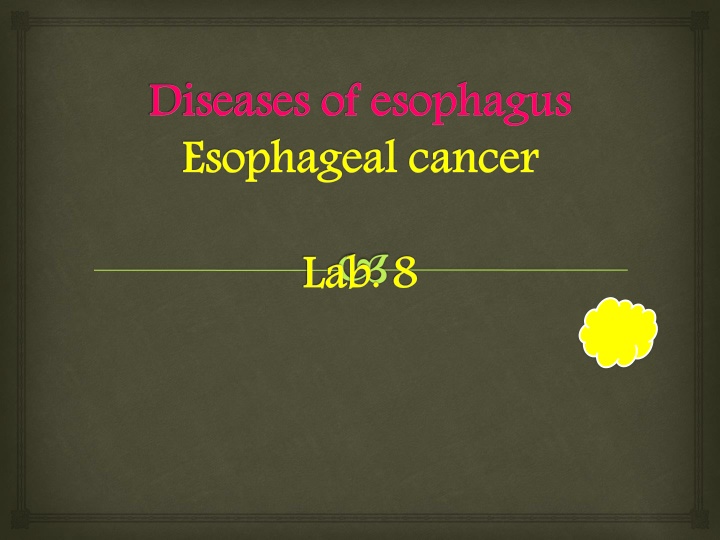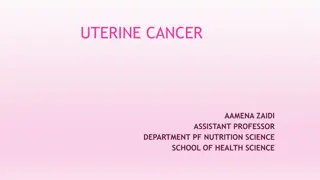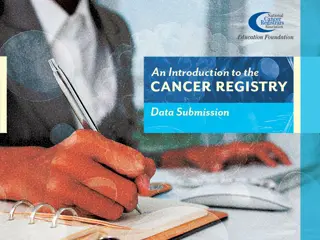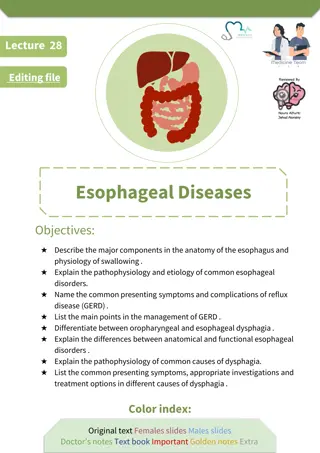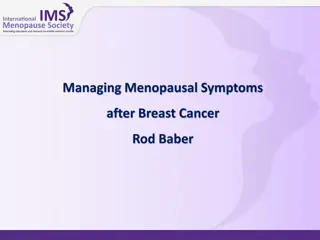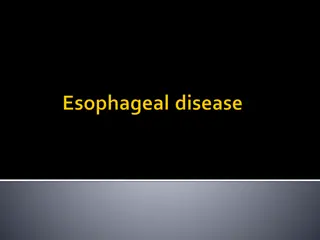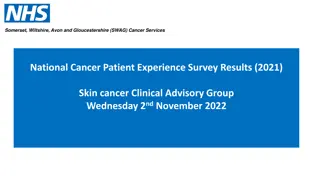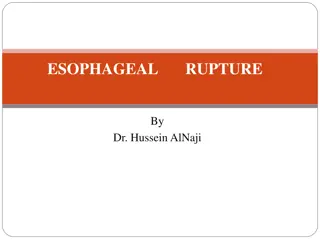Overview of Esophageal Cancer: Symptoms, Causes, and Types
Esophageal cancer affects the long tube connecting throat and stomach. Learn about its symptoms, causes, types like adenocarcinoma and squamous cell carcinoma, and risk factors like GERD and smoking.
Download Presentation

Please find below an Image/Link to download the presentation.
The content on the website is provided AS IS for your information and personal use only. It may not be sold, licensed, or shared on other websites without obtaining consent from the author.If you encounter any issues during the download, it is possible that the publisher has removed the file from their server.
You are allowed to download the files provided on this website for personal or commercial use, subject to the condition that they are used lawfully. All files are the property of their respective owners.
The content on the website is provided AS IS for your information and personal use only. It may not be sold, licensed, or shared on other websites without obtaining consent from the author.
E N D
Presentation Transcript
Diseases of esophagus Esophageal Diseases of esophagus Esophageal cancer cancer Lab. Lab. 8 8
Esophageal cancer Esophageal cancer is cancer that occurs in the esophagus a long, hollow tube that runs from your throat to your stomach. Your esophagus helps move the food you swallow from the back of your throat to your stomach to be digested. Esophageal cancer usually begins in the cells that line the inside of the esophagus. Esophageal cancer can occur anywhere along the esophagus. More men than women get esophageal cancer. Esophageal cancer is the sixth most common cause of cancer deaths worldwide.
Symptoms 1. 2. 3. 4. 5. Difficulty swallowing (dysphagia) Weight loss without trying Chest pain, pressure or burning Worsening indigestion or heartburn Coughing or hoarseness Early esophageal cancer typically causes no signs or symptoms.
Causes It's not exactly clear what causes esophageal cancer. Esophageal cancer occurs when cells in your esophagus develop errors (mutations) in their DNA. The errors make cells grow and divide out of control. The accumulating abnormal cells form a tumor in the esophagus that can grow to invade nearby structures and spread to other parts of the body.
Types of esophageal cancer Esophageal cancer is classified according to the type of cells that are involved. 1. Adenocarcinoma. Adenocarcinoma begins in the cells of mucus-secreting glands in the esophagus. Adenocarcinoma occurs most often in the lower portion of the esophagus. Adenocarcinoma is the most common form of esophageal cancer in the United States, and it affects primarily white men. 2. Squamous cell carcinoma. The squamous cells are flat, thin cells that line the surface of the esophagus. Squamous cell carcinoma occurs most often in the upper and middle portions of the esophagus. Squamous cell carcinoma is the most prevalent esophageal cancer worldwide.
Types of esophageal cancer 3. Other rare types. Some rare forms of esophageal cancer include small cell carcinoma, melanoma and choriocarcinoma. sarcoma, lymphoma,
Risk factors 1. Having gastroesophageal reflux disease (GERD) 2. Smoking 3. Having precancerous changes in the cells of the esophagus (Barrett's esophagus) 4. Drinking alcohol 5. Having bile reflux 6. Having a steady habit of drinking very hot liquids 7. Not eating enough fruits and vegetables 8. Undergoing radiation treatment to the chest or upper abdomen
Complications As complications, such as: esophageal cancer advances, it can cause 1. Obstruction of the esophagus. Cancer may make it difficult or impossible for food and liquid to pass through your esophagus. 2. Pain. Advanced esophageal cancer can cause pain. 3. Bleeding in the esophagus. Esophageal cancer can cause bleeding. Though bleeding is usually gradual, it can be sudden and severe at times.
